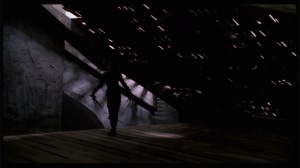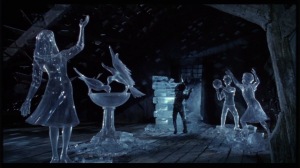In modern society, it’s difficult to find a film that can be classified as completely original. Whether its intentional or accidental, there are always cues that signify genre which indicate the audience what kind of film they are watching. There are many different types and genres of cinema, some which have been forgotten with time and some which still thrive in postmodern cinema. National Cinema’ is such a broad subject to touch on; If I were to reflect on each film culture of the world, I’d be here for days, years, lifetimes. Instead, I’m going to narrow it down to one culture, and one decade, well, roughly. The era of German expressionism is one of my favourite times in film history, and in fact, inspired me to make my first short film in high school. I wanted to delve into this film style again to see if it still inspired me and shone through my work. I’ve only been a filmmaker for two years now, so how can I be sure where I’m headed to in the future? What are my inspirations? I haven’t had a time to stop and think clearly about this question. My tastes may have changed in the past two years, into me liking something else better, drawing on another genre more… this answer I’m not sure of.
German expressionism didn’t begin with film, but rather with art. The artistic movement began in 1905, dealing with the psychology of a defeated nation after World War I, expressing emotions like humiliation, betrayal and anger (German Expressionism, 2013). During the war, German audiences flocked to anything that would distract them from the global conflict they were involved in. “German filmmakers, taking advantage of the cultural fixation, pumped out more films during this period than any other point in the last 50 years “ (Martin, 2015). Expressionism became a most notable notable film movement from 1919 – 1926 (Thompson & Bordwell, 2010), due to Germany being cut off from international films and were forced to create a film market of their own. The German government began to support their film industry, wanting to create propagandising films in order to compete with other foreign films (German Expressionism, 2013).
Ironically, I haven’t watched many expressionist films. I’ve seen bits and pieces; however, I aim to in the future. For those I have watched, it’s been a fair while. So with me not watching expressionist films, are they still in the forefront of my mind when I make films? Can I really have inspiration from them without continuously watching them?
I haven’t ignored the genre completely, as I’ve watched films that have directors who are inspired by the genre itself. Tim Burton, my favourite director alongside Wes Anderson, is heavily inspired by the expressionist era. The first film of his I watched was Edward Scissorhands, which is heavily inspired by the expressionist era.


I look at these images and I get almost an itch, where I really want to make something that visually looks like these images. I tend to flock to dark storylines and corrupt characters. The expressionist films produced in the 1920s came attached with a sombre and depressive mood, featuring corrupt characters and often invoked distorted and abstract images, as it was an era that opposed naturalism. The mise-en-scène of expressionist films held many characteristics, one of the most noteworthy being the use of chiaroscuro lighting, which is the use of high contrast lighting between dark and light colours, which helped add to the dreary atmosphere captured in these films (Kevin, 2014). Along with chiaroscuro lighting, the use of shadows and abstractly painted sets created an otherworldly atmosphere the expressionists loved.
I don’t think I’ve been making films long enough to say if the expressionist style influences me, however, I know they inspire me. The expressionist were non conformists and they weren’t worried about other people’s opinions, and that’s how I want to be. It’s easy to get wrapped up in other people’s ideas and lose yourself in the process. I want to be able to express myself the same way the expressionists did and love it because it’s a reflection of me. I’d much rather make a film that screamed me than a repetitive summer Hollywood film.
As I said before, one of the main reasons I love expressionist films is for the corrupt characters. I always wondered why I love the dark and disturbed characters most in film and TV. From Malfoy in the Harry Potter series, Moriarty in Sherlock Holmes (especially Moriarty), the Joker & Harley Quinn from Batman, and almost every psychopath that is escaping my mind, is usually one of my favourite characters in a story. The crazy, mental and delusional characters, to me, have so much more depth and make me shiver with excitement. They also show so much passion, even if it’s for the wrong reasons. It’s not that I identify with these characters personally, but maybe, just maybe, it’s because of the influence of expressionist films shining through me. I hope to write a character as brilliant as these ones when I get the creative freedom too. The crazy characters and corrupt storylines just seem to sit with me more than hollywood dramas and comedies. So, do I want to produce an expressionist in the future? Yes. Why? Because I want to know what it’s like to invest so much energy and emotion into a film so freely and so artistically. I want to be able to express emotions like Robert Wiene, F. W. Murnau and Fritz Lang did in their iconic films.
I’ve made one expressionist inspired film before (my first short film ever) in the style of Film Noir, and I can say it was one of the funnest experiences of filmmaking i’ve had. Designing the dramatic lighting, the costumes, using a mustang as a prop and was so enjoyable because I could be so creative and expressive with it. Now this film wasn’t full on expressionist, but it was still a great experience i’d love to do again. I still look back at the video and enjoy it, despite it being a little crappy (understandably). Even though my second actor pulled out and it took me hours to set up the lighting, and was a one man team on this film, I would still do it all over again.
Even though my film isn’t brilliant, I’ve fallen in love with the style. While researching expressionist styles, images like these came into my mind just thinking about the style. Due to my mind being so stressed out with Studio 3 and CIU final project work, no, I did not get any ideas to mind because I’ve burnt myself out beyond repair. Nevertheless, I do know for sure I will have plans in the future, even if it isn’t 100% expressionist, and only 10% expressionist. I don’t know how else to say that expressionism inspires me, or influences me. It just does. I love crazy things and crazy people, and if those aren’t key factors in expressionist films, I don’t know what else is. (I know it’s not the same for all expressionist films, but it’s a common theme)…
So all in all, the chiaroscuro lighting, the dramatic tone to the imagery and all of the crazy, is why I love expressionist films. I will definitely try and get in touch with the genre more deeply and explore it more, along with other genre’s.
REFERENCES
(2010). German Expressionism. In K. Thompson, & D. Bordwell, Film History: An Introduction, Third Edition (pp. 87-102). New York: McGraw Hill.
‘German Expressionism’. 2013. Historical Background of German Expressionism.http://madgermanexpressionism.blogspot.com.au/2012/03/historical-background-of-german.html
Martin, T. (2015). World of Light and Shadow – German Expressionism and its Influence on Modern Cinema.http://centerforcreativemedia.com/index.php/german-expressionism/